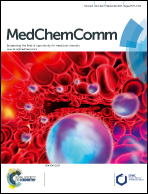Chemoprevention effects of a sulindac-based compound on TPA-induced skin inflammation in mice
Abstract
Inspired by curcumin, which is a natural traditional Chinese medicine, a sulindac-based compound was designed and synthesized. The anti-inflammatory activity of the sulindac-based compound was evaluated in a TPA-induced mouse ear edema model. In comparison with curcumin and sulindac, topical application of the sulindac-based compound effectively regulated the expression of TPA-induced IL-1β, IL-6, TNF-α and COX-2. Mechanistically, the sulindac-based compound markedly inhibited the expression of p65, phospho-p65, IkB-α and phospho-IkB-α. It is also indicated that the sulindac-based compound significantly mediated PI3K p85, phospho-PI3K p85, Akt and phospho-Akt expression. Moreover, the sulindac-based compound significantly downregulated the expression of IKK by inhibiting the PI3K/Akt signaling pathway, and thereby suppressing the activation of NF-κB stimuli by TPA. These results revealed that the sulindac-based compound, used for transdermal application, may improve its activity and reduce the adverse effects developed, suggesting its utilization as a promising anti-inflammatory agent for the treatment of inflammation-associated skin diseases.


 Please wait while we load your content...
Please wait while we load your content...